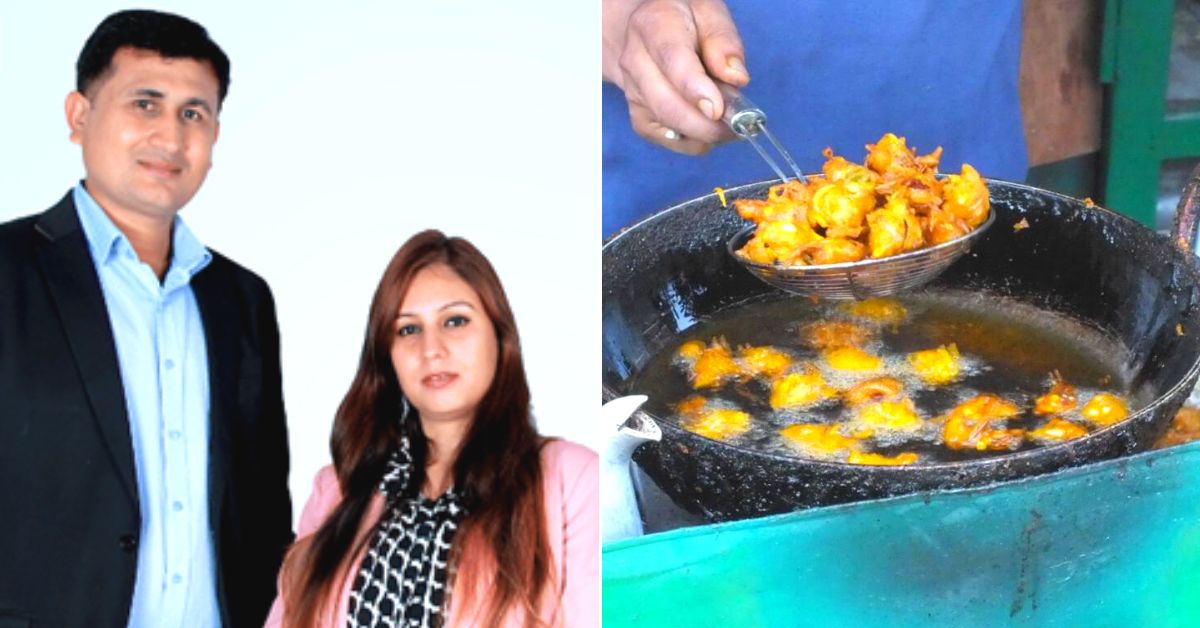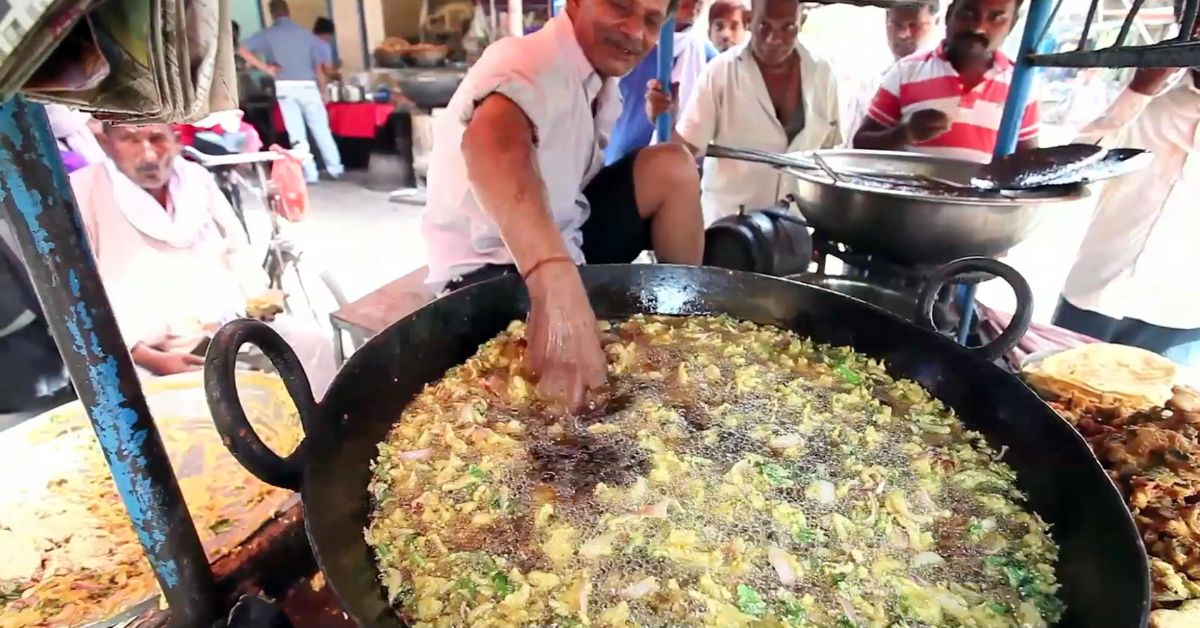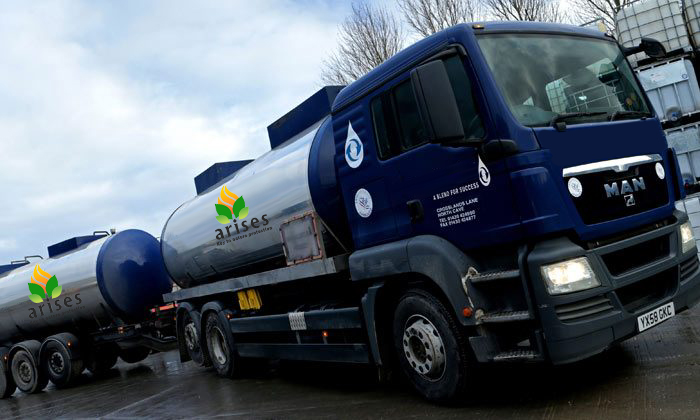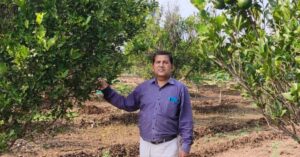Delhi Couple Converts 3M Litres of Used Cooking Oil from Eateries into Biodiesel
KNP Arises, a Delhi-based startup run by Kirti and Sushil Vaishnav, collects used cooking oils from restaurants and converts it into biodiesel, which generates 80% lower carbon emissions as compared to fossil fuels.

In 2019, the Food Safety and Standards Authority of India (FSSAI), the country’s statutory regulator, announced that restaurants or eateries could no longer reuse cooking oil more than three times.
They also announced that any “cooking oil having developed TPC [total polar compounds] of over 25% shall not be topped up with fresh oil.” The formation of TPC is a result of repeated using and frying of edible oils, rendering them unfit for human consumption.
Thus, eateries and restaurants are required to dispose of used cooking oil (UCO) to authorised collectors. After all, proper disposal of cooking oil is essential.
Speaking to The Better India, Kirti Vaishnav, the co-founder of KNP Arises, a startup that not only collects UCO but also converts it to biodiesel, notes that the consequences of shoddy disposal are severe.
“If thrown directly into the drainage system, it pollutes water bodies, clogs our sewer system and generates a heavy load on our effluent treatment plants (ETPs). A litre of used cooking oil can pollute 20,000 litres of water. Besides, unethical disposal of UCO also circulates in our food cycle. As per FSSAI data, currently, 60% of UCO gets sold back to small food vendors which then comes back to our plates and causes serious health issues. This adulterated UCO causes many diseases like cancer, Alzheimer’s, Parkinson’s, and heart-related problems,” claims Kirti.
“By collecting UCO and converting it into biofuel, KNP Arises is not only looking to safeguard society’s health, but also keep the environment clean and green,” she adds.
Co-founded by Kirti and her husband Sushil Vaishnav, KNP Arises is in the business of generating eco-friendly and renewable energy in the form of biodiesel from UCO.
The Delhi-based startup collects used cooking oils and fats from restaurants and converts those oils into biodiesel, which generates 80% lower carbon emissions as compared to fossil fuels.
Kirti says that the startup provides a wide array of services to help factories manage their waste oils and fats. With tailor-made packages for supermarkets and fast-food outlets, KNP Arises attempts to also eliminate any potential issues of dealing with waste.
She adds that they are also attempting to reach out to individual homes because quite often UCO gets thrown into drains causing water pollution and blockages in sewer pipes.
Their aim is to recycle 100% of the waste generated so that none has to be disposed of in a landfill. So far, they claim to have collected over 3 million litres of used cooking oil (UCO) from more than 40 cities.
Arriving at a solution
From Bundi district in Rajasthan, Sushil and Kirti had extensive corporate careers spanning more than 15 years across different industries in India and abroad before establishing KNP.
Sushil specialises in food technology with an MBA in operations, while Kirti is a graduate in electronics and communication engineering with a talent for marketing and tech management.
“Having extensive experience in the food industry, technology and supply chain, we wanted to work towards improving the quality of street food in our cities. During our market research, we observed a lack of awareness and infrastructure for used cooking oil. We wanted to make sure once our families go out to eat, they can eat without health risks,” says Sushil.
“One fine day a couple of years ago, we were eating at a good restaurant and found they were not aware of UCO disposal practices. Later, after visiting other restaurants, we realised many of them were not aware that UCO should be disposed of after using it a certain amount of times. Meanwhile, those aware of the health and environmental risks associated with UCO struggled with how or where to dispose of it. So, we decided to help them with a sustainable solution and incorporated KNP Arises Green Energy Private Ltd in November 2019,” explains Kirti.

Collecting from source
Across 40 cities, KNP Arises collects UCO from every food business operator (FBOs) possible like restaurants, hotels, small food hawkers, caterers, cloud kitchens, temples and gurudwaras, office and institutional canteens, and snack factories.
“We collect used cooking oil (UCO) from different locations and store it in our centralised warehouse where preliminary treatment of oil takes place. Now, this oil is ready for biodiesel conversion. With transesterification (the process in which fat or oil reacts with an alcohol to form esters and glycerol), UCO is converted into biodiesel,” explains Sushil.
“Since there is a huge scarcity of raw material (UCO) for biodiesel generation, our focus starting out is on collection. At present, we don’t own any plant for biodiesel conversion. Rather, we have tied up with a third-party operator to help convert UCO into biodiesel. Currently, we sell our biodiesel to major public sector oil marketing companies (OMCs) like HPCL and BPCL, those in the transport industry, furnaces, and users of boilers, and many more applications,” he adds.
How does KNP collect UCO?
Anyone willing to dispose of UCO can place a request on their mobile application, and their operations team will connect with them to ensure “timely collection”.
The startup is developing an IoT (internet of things) based container that will increase “our collection capabilities and create a seamless flow of information, transparency and efficient supply chain for the collection”.
The startup’s work generates two distinct advantages for food businesses, says Kirti Vaishnav. One, KNP pays for the UCO collected and two, the entire process is done with “strict compliance with FSSAI and environment guidelines.”
Experts note that a litre UCO can produce 850 to 900 ml of biodiesel depending on the quality of the raw material used.
“Each food business has different challenges with respect to managing their waste oil. For example, small restaurants prioritise disposal in the shortest amount of time given that they don’t have space to store the waste. Meanwhile, big QSR chains require central controls on disposal, and big hotels need compliance on priority and ease of disposal. Supermarkets, too, have issues with expired products and damaged oil management. As per their requirements, we provide them with respective solutions with the help of mobile applications and logistics services. We also provide services related to their food safety training, compliance management services and other related services,” claims Sushil.

Incubation with an MNC
KNP Arises is one of the four “breakthrough startups” as part of Shell India’s E4 programme.
According to the incubation centre’s website, “Shell E4 Program provides a platform for collaboration and conversation around valuable energy transitions, offering startups an opportunity to bring their ideas to life with Shell’s guidance and support.”
The Delhi-based startup’s incubation journey with the energy giant’s startup incubation program started in April 2022.
“Incubation with Shell India has given me the opportunity to connect with the right people from the industry who have guided us to find the right path. We have received blanket support whenever required. It has been an amazing experience with the Shell India E4 team,” says Kirti.
Meanwhile, their business model is an aggregation of the used cooking oil pretreatment and generates revenue by selling UCO and biofuel.
Since its inception, Kirti claims that the startup has generated revenues of Rs 10 crore. If you found our stories insightful, informative, or even just enjoyable, we invite you to consider making a voluntary payment to support the work we do at The Better India. Your contribution helps us continue producing quality content that educates, inspires, and drives positive change. Choose one of the payment options below for your contribution- By paying for the stories you value, you directly contribute to sustaining our efforts focused on making a difference in the world. Together, let’s ensure that impactful stories continue to be told and shared, enriching lives and communities alike. Thank you for your support. Here are some frequently asked questions you might find helpful to know why you are contributing?

“Last year our revenue was Rs 3.5 crore and yes, we have broken even. Our aim is to take a leadership position in supplying all types of agri-waste for conversion into advanced biofuel. Till now, we have raised funding worth Rs 1 crore. We are also raising funds for pivoting. With these , we are expecting to grow fast and meet India’s advanced biofuel requirement,” she adds.
(Edited by Pranita Bhat)
(Images courtesy KNP Arises, Down to Earth and Caters News Agency)
This story made me
-
97
-
121
-
89
-
167
















